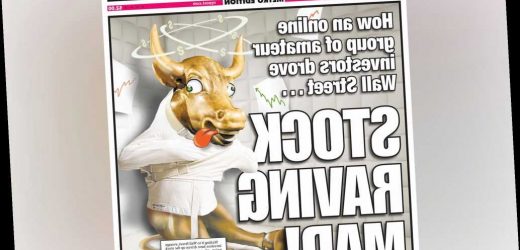More On:
gamestop
Top GameStop investors reap billions from dizzying stock surge
White House monitoring GameStop stock explosion
Mets fans worried over Steve Cohen’s GameStop involvement
Why GameStop is surging and what it means for the stock market
In the 1630s, it was tulips. In the 1990s, it was Netscape and Pets.com. Later, as we all know, it was housing. Today, the warning sign flashing “danger,” signaling that the stock market has lost its mind, is GameStop.
GameStop is a video game retailer that has been priced at about $3 to $10 a share for much of the year. But in the past few days, individual investors have driven the share price above $300.
Many of these buyers are using Robinhood, an app that lets anyone trade stocks without a commission. Because of the pandemic, people have plenty of time on their hands, and are looking to make cash, and it’s fueled a spectacular rise in individual day trading.
Why are they buying GameStop? Well, some of the commentators on “WallStreetBets,” the Reddit message board driving the frenzy, believe it’s a good company.
But mostly they’re out to hurt the big guys.
Hedge funds love shorting stocks, a trading technique where you make money when stock prices go down. Companies often go belly up amid short selling “bear raids.” That’s why small investors hate hedge funds so much.
When word spread among Robinhood traders that GameStop was heavily shorted by the big guys, the tables were turned into a bull raid. They drove up the price, and all those bets that GameStop would decline in value failed. A “short squeeze” was on at a level sophisticated market players hadn’t seen in years.
At least one big hedge fund, Melvin Capital, needed a bailout as prices of GameStop spiked a gazillion percent in a matter of days. My trading sources say there will likely be other big players seeking money to stay alive.
Delicious, right? For those who think — not unwarrantedly — that the market is rigged against them, the Robinhood revolt is a wonderful bit of schadenfreude.
But nothing has changed about GameStop’s business. It’s still primarily a brick-and-mortar retailer in an electronic world. It’s certainly not worth $300 a share. So while Robinhood buyers who got in early made a good bit of money — at least on paper — the bubble will eventually burst, and the shares will likely fall back to earth again.
The problem is that GameStop isn’t the only stock this is happening to. Blackberry, makers of the handheld device you no longer use, and AMC, owners of movie theaters you no longer go to, are also looking like Apple on steroids.
And what’s really worrying is that Dow 30,000 is all about this sort of irrational exuberance. Yes, we laugh at $300 GameStop, but is Tesla really worth $880 a share? It isn’t just Robinhood traders working in concert who are driving up company valuations; it’s hedge funds and Wall Street banks research departments and large mutual funds. Because even as we face record unemployment and a slow economy, they can make money that way.
Bubbles always burst, as they did during the dotcom craze (as it turned out most Web sites weren’t the next Google), and later during the housing bonanza that sparked the financial crisis and the Great Recession.
Wall Street lost a lot of money those days — and faced more than a few costly investigations. But Wall Street’s losses were nothing compared to the damage done to small investors.
Many bet their life saving on Internet stocks on the delusion that they can trade and gamble with the best of them.
They can’t, of course.
If history and common sense are any guide, GameStop is the canary in the coal mine. And everyone — from the small investors to Big Banks — is in for a scare.
Share this article:
Source: Read Full Article


